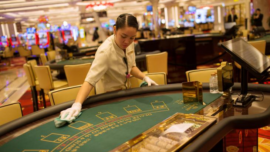Macau (MNA) – The Court of Second Instance (TSI) has annulled a previous court decision that Wynn Resorts (Macau), S.A. and junket operator Dore Entertainment Co. Ltd would not have to repay a HK$17 million (US$2.1 million) debt to a VIP player.
Previously four people had pressed forward charges at the Court of First Instance (TJB) against Dore and Wynn Resorts, demanding the repayment of some HK$64 million deposited in the company’s VIP room at Wynn Macau, either through money deposit or through gaming chips.
In April 9, 2018 the TJB ruled that three of the players fail to show proof that they had indeed deposited the amounts claimed in the VIP room, with only one gambler managing to provide a receipt proving he had provided HK$6 million to the cage manager.
Dore was ordered to repay the amount, with Wynn absolved in the case but with the TSI later ruling that the gaming operator also had responsibilities in repaying the debt.
One of the players who saw their repayment action rejected by the TJB – a man claiming he provided HK$17 million through four loans to Dore which was then deposited in a Wynn VIP room – appealed the decision to the TSI.
In this case, Wynn and Dore stated in their defense that the room’s cage manager did not have the power to lend, nor the power to receive money or payments from customers.
The player had argued that the money was not provided as a ‘loan’ but, rather, as an agreed deposit agreement, something that was accepted by the presiding judge, but with TJB later ruling the man failed to provide evidence the money had actually been provided.
Today, the TSI ruled that since the nature of the sum provided had been changed from a loan to a deposit, the court should have analysed the evidence over that new definition.
‘Although the loans were not established, it was essential to know whether the ‘deposit agreement’ mentioned by the [player] existed and whether the deposit agreement included a repayment clause, but those matters were completely ignored by the contested decision,’ the court stated.
The court then stated that in its understanding the ‘uniformity, harmony, consistency and logic’ of judgment required a full review of the case facts with the previous TJB ruling annulled.





















